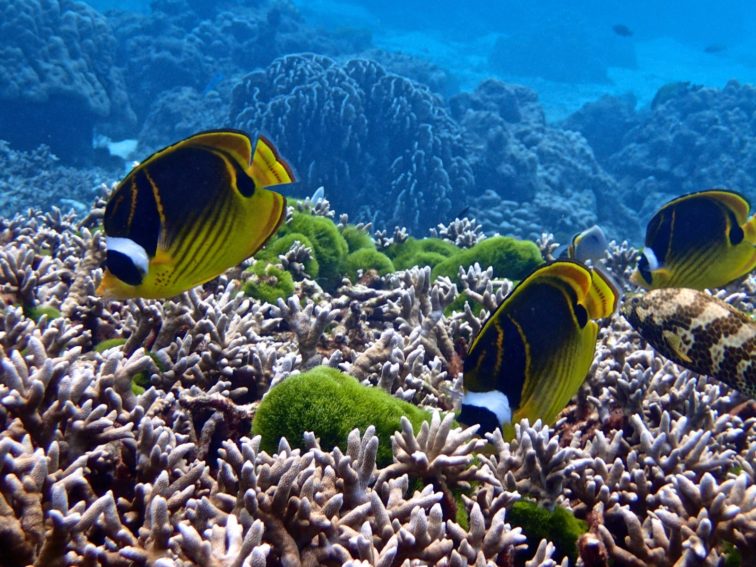Damage or Protection ? What your Sunscreen could be doing to our Coral Reefs? 🙁
It’s no secret anymore that coral reefs all over the world are under threat from the intense pressures and stresses placed on them due to human activity.
If you need an indication to the scale of the problem that coral reefs face, we highly suggest you watch a movie called “Chasing Coral” on your Netflix, any reason to Netflix & chill is a good one right?
So let’s discuss the issues facing our reefs here in Phuket, what sunscreens have to do with saving coral and also what else we can do to help protect our reefs.
Coral Reefs In Phuket Are Beautiful
It is a not so well known fact that at almost any beach in Phuket, you can find small but still beautiful coral reef hiding in plain sight. One of our most popular dives for beginners here in Phuket is on a beach called “Kata Beach” which sports a large and intact coral reef system that is great for scuba diving and snorkeling.
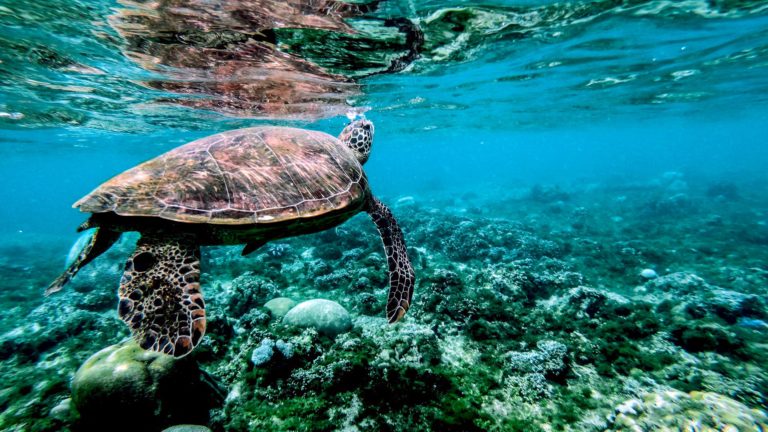
Many other beaches here also sport small coral reefs and all of them are in some way under threat due to the increased tourist numbers due in part to Phuket’s massive popularity with ocean & beach going holiday makers, and why not, Phuket beaches are world renown and so are many of our dive sites.
So why do you keep on hearing about sunscreen and coral reefs in the same sentence, why did Hawaii ban sunscreen and require that you use reef safe sun cream and is there something similar happening in Thailand?
Chemical Sunscreens Damage Coral Reefs
Before we get all sciency (totally not a word) on you, we’d like to do a quick experiment. Pick up or grab the closest sunscreen, sun cream or even cosmetic that you use with an SPF rating, got one?
Next flip it over and check the ingredients on the back, if you’ve picked up a sun cream or sunscreen, it should have something that looks like this on the back.
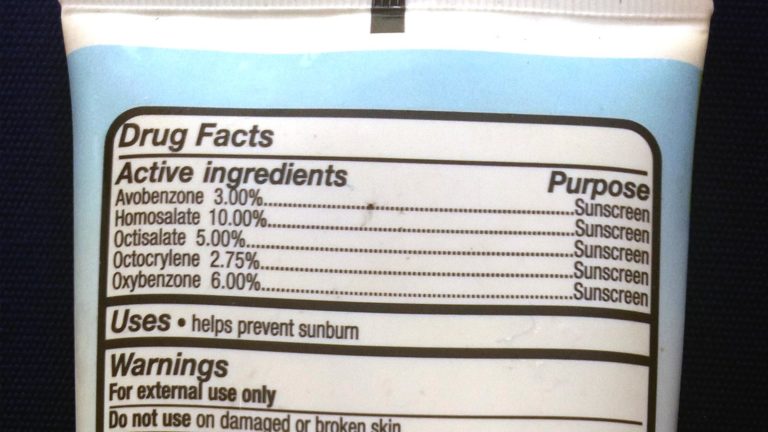
Clearly labelled will be the products “Active Ingredients”, this refers to the ingredients that protect your skin from the sun’s harmful UV radiation, which we will go into more detail shortly.
If your sunscreen does not have any active ingredients clearly marked, you should be concerned as they might be desperately trying to hide them in the ingredients section, so double check. If your sun cream or cosmetic with an SPF rating contains any of the following active ingredients, than you need to continue reading:
- Oxybenzone
- Avobenzone
- Octinoxate
- Octisalate
- Homosalate
- Octocrylene
- Octyl Methoxycinnamate (OMC)
How did you go, do any of these appear in your ingredients or active ingredients? If no, congratulations you are likely already using a completely natural sunscreen or cosmetic and you should be happy with your decision to help protect the environment.
If not and one or more of these are present, than quite simply you are endangering the health of coral reefs and possibly your own.
Oxybenzone & Other Synthetic Chemicals
It is estimated that over “14,000 tons of toxic sun cream gets washed into the ocean” on an annual basis. Every time you enter the ocean while wearing sunscreen you are washing that sunscreen onto the reefs, totally unintentional but it’s happening L
Recently studies have shown that the chemicals used regularly in sunscreens severely damage coral reefs, you can read a bit more about toxic sunscreen chemicals, or you can stay for our really simple description J
Oxybenzone and other chemicals are not biodegradable; they are toxic to sensitive organisms like corals. Once in the environment (food chain) those chemicals will bio-accumulate (more of them than normal) and become a toxin that will kill corals exposed to them leading to this…
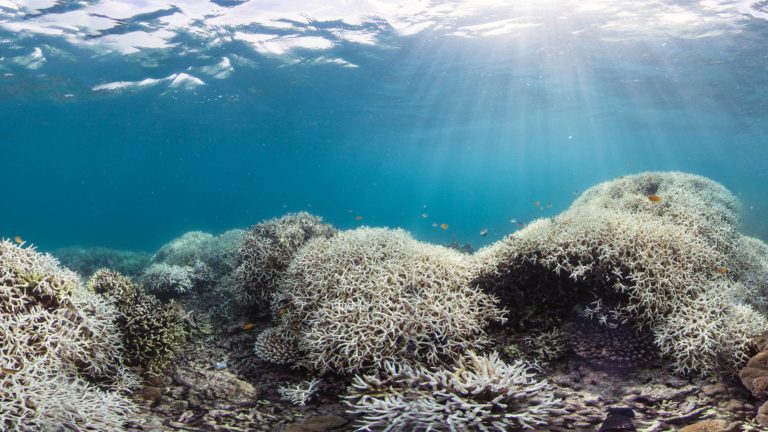
The photo above shows what dead coral reefs look like. All that is left is the white skeletons of once vibrant and living coral reef.
Many of these chemicals are also heavily linked to other health concerns for us humans, especially Oxybenzone*, which is a known photocarcinogen it causes hormone disruption and allergies plus there is mounting evidence that it causes cell and DNA damage, which may lead to skin cancer.
*Find out more about Oxybenzone HERE
Hawaii Simply Banned Those Chemicals
If you are a small state or territory like Hawaii who relies heavily on tourism dollars brought in from activities like scuba diving, snorkeling, beaches, surfing, fishing and other water based activities, than you are going to want to protect your coral reefs right?
Thanks to research done in Hawaii and made famous thanks to their lawmakers, Hawaii just flat out banned many of those active and damaging chemical ingredients we listed earlier.
Essentially that means you as a visitor are now required to help their environment by using reef safe and environmentally friendly sun care products. Pretty cool right, it’s what we as divers have been asking for, global attention to the perils that face coral reefs and word is spreading!
The Natural & Effective Alternatives
Thanks in part to Hawaii and national marine parks in Mexico, The Maldives, Belize and Australia, global attention has been focused on visitors being asked to use natural sunscreens when diving or snorkeling.
This is in part because it is one of the easiest and simplest things we can all do to help, which will remove one of the big pressures coral reefs are facing, that of toxic chemicals. Natural sun creams like those which use non nano Zinc Oxide (you won’t find that on any banned list) happen to be one of the best and most effective forms of protection against harmful UV radiation.
Check out this graph highlighting Zinc Oxide’s effectiveness versus Titanium Dioxide and a harmful synthetic known as OMC that we listed on our naughty list.
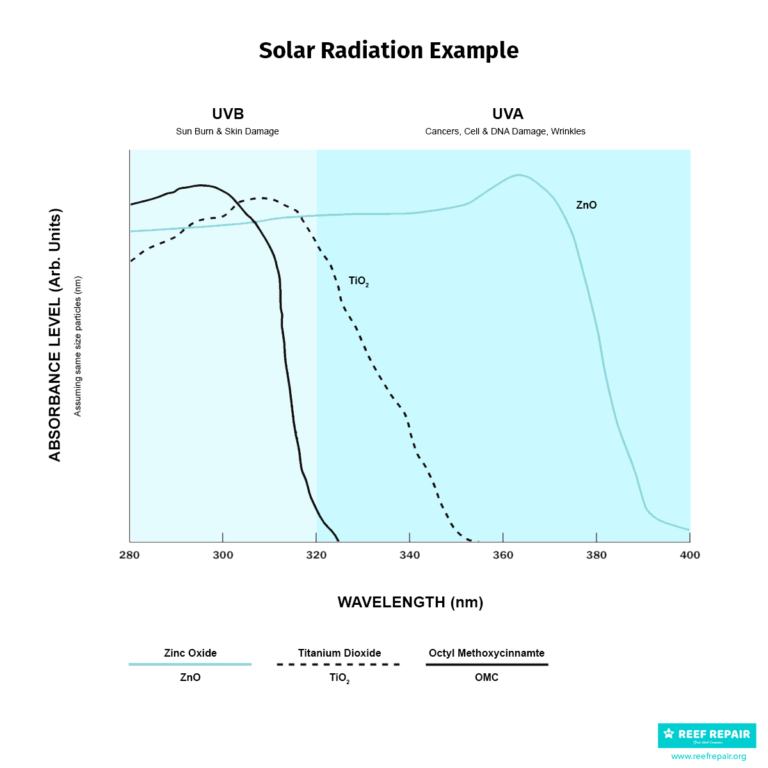
So based off that graph above you should be looking for sunscreen that is labelled as Reef Safe, but you really want one that uses non nano Zinc Oxide as their primary active ingredient, because that gives you the best protection against cancer causing UVA rays and skin burning UVB.
As a footnote, Zinc Oxide is a natural mineral used in nappy rash cream, essentially it is a very safe ingredient and it protects you from the sun!
So what is Andy’s Scuba Diving doing to help?
Well since we really like coral reefs, don’t much like cancer or sun burn, love scuba diving and also want to protect coral reefs here and all over the world, we decided to purchase and stock a reef safe sun cream in our dive shop and classrooms for you, our guests.
Furthermore, you can order when you book your diving with us, we’ll add it to your invoice and we will deliver to you on your diving day or when you come to our classroom for your diving course! How cool is that?
Less items to carry in your suitcase, more space for your dive gear – winner/winner 😉
So now we don’t just offer Phuket’s best scuba diving day trips, we also offer our divers the chance to help protect our oceans and coral reefs by being able to put away toxic chemical sunscreen and use a reef safe alternative that lives up to the hype.
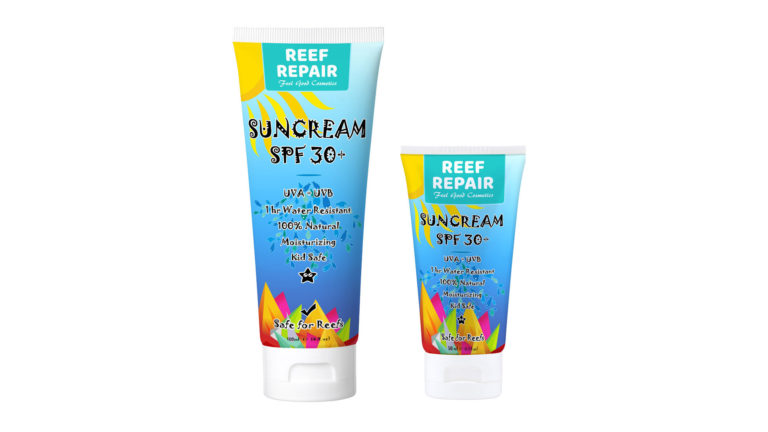
Reef Repair sun cream comes in handy 120ml or 50ml sizes – priced at 500thb & 350thb respectively, in easy to use snap cap bottles (great for slippery wet hands), aside from being beyond reef safe plus really good at preventing sunburn, it is easy to apply, a little goes a long way, non-oily and best of all water resistant for well over 80 minutes!
It is time we all stood up and did something to help protect our oceans and protecting coral reefs from toxic sunscreen exposure is one of those ways. It has become a regular in our dive kit bags and we simply would never leave home without it here in Phuket.
Is it Time To Go Diving yet?
Phew! We know that was a really long article and we truly appreciate you taking the time to read it to the end, protecting coral reef is so very important for the health of our oceans that we just couldn’t seem to stop writing!
So does that mean it is finally time to stop reading and come and do some awesome scuba diving in Phuket? Yes I think you are right and that sounds like a great plan to us 🙂
Happy Diving All!

